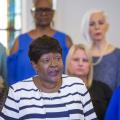ON NOV. 3, 1979, five young labor organizers were murdered by Nazis and Klansmen in Greensboro, N.C. Ten were wounded. And a low-income, African American community was terrorized. The police knew the ambush plans and chose to be visibly absent. This tragic event eerily foreshadows what happened in our nation’s capital on Jan. 6. Our country is at a boiling point. We are closer than many want to admit to losing this developing republic.
To address together growing national divisions, we must struggle with three evils: white supremacy, massive economic disparity, and a significant decline in the moral fabric of this nation. These issues must be addressed concurrently if they are to be effectively addressed at all. To do this, we need to design a process in which people can walk toward each other and, ultimately, with each other out of this moment and into a more just and equitable future.
Truth must be foundational in the process we design. Attempting to advance policies to address the legacy of racism and segregation without first establishing the truth of the impact of that lived history at the community level risks exacerbating our divisions.
We have great hope that a national Commission for Truth, Racial Healing, and Transformation, as introduced in Congress by Rep. Barbara Lee (D-CA) and Sen. Cory Booker (D-NJ), can provide such a process for this essential work. We support an executive order by President Biden to establish this commission.
Our hope is based, in part, on our experience with the Greensboro Truth and Reconciliation Commission (TRC), a local effort to establish an independent body (in conjunction with the International Center for Transitional Justice) to work toward community truth around the “Greensboro Massacre” in North Carolina.
In the aftermath of the 1979 murders, two all-white juries in criminal trials found the white supremacists not guilty. The jury (including one person of color) in a civil trial found them, along with police officers, jointly liable for wrongful deaths.
This marginal victory in civil court, however, did not address the deeper meaning of these events. Survivors and other community leaders believed it was irresponsible to leave the history unresolved. The Greensboro TRC began in 1999 and delivered its final report in 2006. Although the Greensboro city council originally opposed the truth and reconciliation process, in October 2020 the council formally apologized for the city’s role in the massacre.
Based on our work in Greensboro, we believe a national commission will be most successful if it is grounded in well-organized, local, truth-telling processes and in coalitions that engage a diverse group of people, particularly those most impacted. Our localities hold hidden histories that we refuse to look at. A truly transformative process will grow out of a strong base of supporters and coalitions during the design, implementation, and follow-up phases of a truth, justice, and reconciliation commission. This base is essential to support people in telling their stories to the commission, for shaping a process in which we can all see ourselves represented (thus giving legitimacy and moral authority), and for working toward recommendations that a commission may make to redress historic and ongoing harms.
The truth process in Greensboro has spanned decades. Some elected officials have been supportive and others have not, but the work of truth-telling moved forward continuously, precisely because of the strong support of diverse stakeholders throughout the city. For a national process to be truly transformative, it must be rooted in a strong, broad, and varied coalition from localities across the country who support the mission and perhaps even drive the process.
We appreciate the courage and wisdom of elected officials pushing for a national commission. We believe truth processes can be helpful, but they are not a silver bullet. And anything rooted only in politics is inherently connected to a flawed paradigm that assumes if someone is to win then someone else must lose. A truly transformative truth and reconciliation process will reveal that “winning” means drawing the greatest potential out of the broadest diversity of our people. This is the goal of the beloved community. This is what we are all striving for.

Got something to say about what you're reading? We value your feedback!


